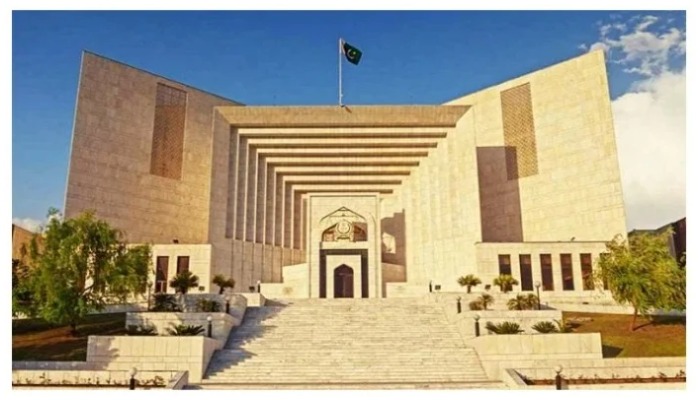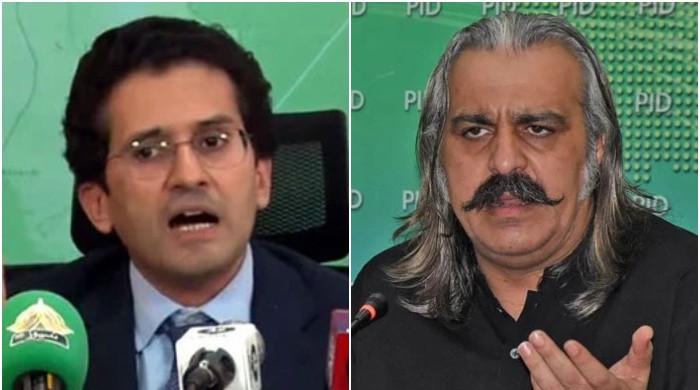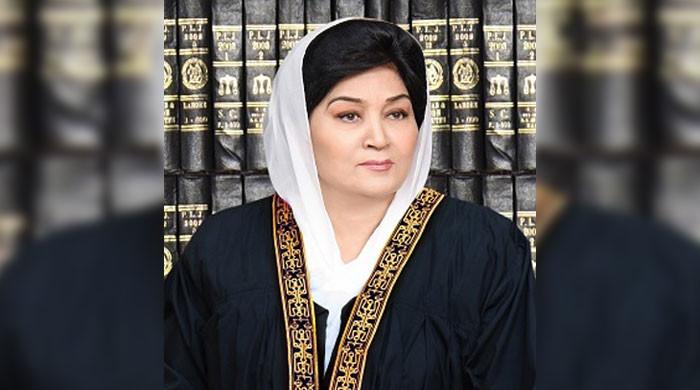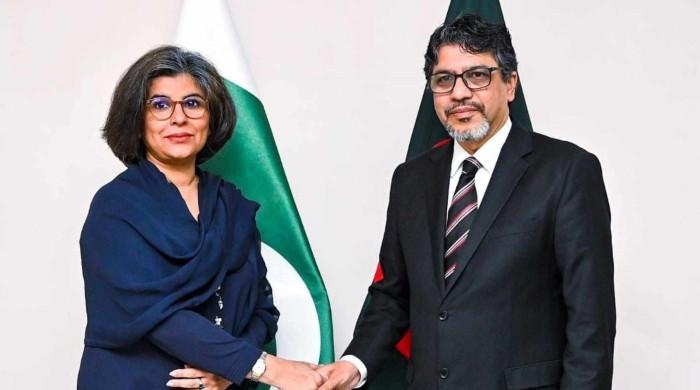Lawmakers bound to follow party policy: SC judge
SC hears presidential reference seeking interpretation on Article 63(A) and SCBA's plea against govt and opposition rallies
March 24, 2022

- SCBA, JUI-F and PML-N submit response in apex court over reference on Article 63(A).
- SCBA says MNAs are independent in using their right to vote.
- JUI declares Article 63A "undemocratic".
ISLAMABAD: The lawmakers are bound to follow the policy of the political party they are affiliated with, Justice Muneeb Akhtar of the Supreme Court said Thursday during the hearing of presidential reference seeking interpretation on Article 63(A).
A five-member larger bench of the apex court, headed by Justice Umar Ata Bandial and comprising Justice Muneeb Akhtar, Justice Aijazul Ahsan, Justice Mazhar Alam, and Justice Jamal Khan Mandokhel is hearing the reference along with a plea filed by the Supreme Court Bar Association (SCBA) against public gatherings of the Opposition and the government in the federal capital — ahead of the no-confidence motion against Prime Minister Imran Khan.
All the ways leading to Red Zone, including D-Chowk, Serena Chowk, NADRA Chowk and Merit Chowk have been barricaded with heavy police deployment to completely seal the area for the hearing of the presidential reference in the apex court today.
Moreover, police personnel are also deputed in and outside the court with water cannons present nearby.
As a result, the petitioners out to visit SC and Pakistan Secretariat faced extreme inconvenience as only Margala Road was open.
"Lawmakers have to vote in accordance with their party's mandate. They have to follow the party policy. Full stop, that's it," Justice Akhtar said.
However, he noted that no MNA can be tagged as "good boy or bad boy".
Meanwhile, Justice Mandokhel remarked that the Article 55 stipulates that all the parliamentary proceedings should be done through voting.
Whereas CJP Bandial stated that Article 63(A) is a "discipline of the emerging political system."
"The article binds the lawmakers to stand by their party no matter even if they are unhappy with it."
At this, Attorney General of Pakistan (AGP) Khalid Jawed Khan said the country's political system is based on Article 63(A) or Article 95 — whose violation could collapse the entire system.
Following the attorney general's response, the bench members flooded the court with questions.
Moving on, the AGP said according to a judgment of the apex court on Article 17(2), the vote on an individual has no substance — it is considered collective and part of the party.
At this, the chief justice said the court was still deliberating over the arguments being presented to it.
"All of these [arguments] are of extreme importance," remarked the top judge.
Justice Mandokhel, contrary to Justice Akhtar, said voting is an individual right and the parliamentarian is not bound by the party. Meanwhile, Justice Ahsan asked whether a lawmaker could vote outside party lines.
At this, Justice Akhtar said political parties are an institution and violating their discipline could weaken or even destroy them.
Justice Mandokhel asked the AGP whether a party member could leave a party if it takes wrong decisions. AGP Khan said that if a member wants to part ways with the party then they should submit their written resignation.
At this, CJP Bandial said: "This means that if a person defects from their party, they will have to face consequences."
While Justice Ahsan observed that if such a thing happens, then a new pandora's box will open for the government as it already has a thin majority in the National Assembly.
Justice Akhtar reiterated that if every member starts deciding their own policy, then the political party would turn from an institution to a mob.
CJP then asked the AGP whether floor-crossing was allowed in other democratic countries or not. Responding to the chief justice, AGP Khan said: "In other countries, prices go down before Christmas. In our country, prices double during Ramadan.
Moreover, Justice Mandokhel asked the AGP whether he wanted the party leader to become the "king"?
"We neither want them to be king nor do we want them to become turncoats," the AGP responded.
The CJP then adjourned the proceedings till tomorrow and issued notices to the SCBA, PTI's allies, and all the political parties for assisting the apex court during the proceedings.
Tiger Force and Ansar-ul-Islam
During the hearing, the Supreme Court also expressed concern over the outfits established by different political parties.
Justice Alam said that the Tiger Force — established by the prime minister during the initial days of the COVID outbreak — and baton-wielding force, an apparent reference to JUI-F's Ansar-ul-Islam, were a "misfortune" for the country.
The apex court asked all the political parties — including the ruling PTI — to follow the law when their respective rallies are held in a few days.
'Govt not satisfied'
AGP Khalid Javed Khan read out the apex court's order issued at the last hearing at the CJ's directive.
Beginning his arguments over the SCBA's plea, AGP Khan said that the government has recorded its stance that it is not satisfied with the progress that occurred in any hearing so far.
The Opposition is also holding a rally at Kashmir Highway and the lawmakers affiliated with other political parties would also use the same way to reach Islamabad.
At this, JUI-F's lawyer said that his client is a peaceful party that has never taken the law into their own hands.
"If the party would remain peaceful, then the government has no issues," the attorney-general said in response.
Earlier, at the outset of the hearing, CJP Bandial said that the matter of an FIR on the Sindh House incident will be discussed in the hearing.
Senator Raza Rabbani proceeded to the rostrum in the courtroom and informed the court that he has appealed to become a party in the case.
At this, CJP Bandial told Rabbani to go back to his seat as the court will hear his arguments later.
SCBA, JUI-F and PML-N submit response
Earlier, SCBA submitted its response in the apex court, stating that voting is an individual right of an MNA instead of a political party's collective right under Article 95.
It declared the MNAs' right to vote for the no-confidence motion against the prime minister to be an individual capacity in its response over the presidential reference for the interpretation on Article 63A of the Constitution Pakistan.
"Every MNA is independent in using their right to vote and there is no disqualification over voting against party policy in Article 63A."
"No MNA can be restrained from voting under Article 63A and every vote cast under Article 95 is counted," SCBA said, adding that the public runs the government system through their elected representatives.
'Article 63A undemocratic'
Meanwhile, JUI-F also submitted its reply over the reference, declaring Article 63A "undemocratic".
"Disqualification on voting against party policy would further weaken the already fragile democracy."
JUI-F said that the article in question obliges the MNAs — who got elected as independent candidates — to follow a political party if they join it after winning.
"The reference seems to imply that the prime minister, president and NA speaker have always been Sadiq and Amin (honest and trustworthy) and will always remain so."
Moreover, the JUI-F said that "it is not necessary that the opinion on the reference is given before polling for the vote of no confidence as the matter will eventually end up in the apex court if a disqualification case is filed against an MNA."
It said that SC's opinion before the voting would make the forum of the Election Commission of Pakistan ineffective.
The response further stated said that PTI is being run by "selected officials" since there hasn't been party election in a while.
"The selected officials cannot direct the MNAs to vote or not to vote under Article63A," JUI-F's reply said.
It said that the National Assembly speaker cannot be given the authority to discard the MNAs' votes therefore the court should refrain from ending the supremacy of the Parliament.
'Premature and unnecessary move': PML-N
Meanwhile, PML-N said in its response submitted in the SC that Article 63A and Article 95 are clear and every lawmaker has the right to vote.
The party seconded JUI-F's argument that the vote of every MNA will be counted and that filing of the presidential reference is a premature and unnecessary move.
Moreover, the response documented by PML-N's lawyer Makhdoom Ali Khan, said that the apex court "has the authority to interpret the Constitution but not to amend it."
Fawad warns SCBA against ‘becoming tool of political parties'
Federal Minister on Information and Broadcasting Fawad Chaudhry said that the members and lawyers of SCBA are elected through voting therefore SCBA or Pakistan Bar Council (PBC) shouldn’t become the subsidiary of any political party, which is apparently happening.
“In my opinion, all the bar councils of Pakistan should take notice of the conduct and role of SCBA president and PBC [towards the presidential reference] and step ahead for their rectification,” Fawad said.
He said that the lawyers are from all the political parties but their role is to keep themselves above the political parties but here the lawyers have “aligned themselves with a political party.”
“It is not about the entire SCBA body but a few individuals on top posts, who have taken the Bar as hostage under their personal interest,” he said.
He said the government has complete hope in the apex court that it will further the case under the constitution and laws.
Moving on to the rally slated for March 27, Fawad said that the government is entirely focused on it.
“This will be a historical rally and the government will end this game of chess that had been started by the opposition,” he concluded.
SC forms larger bench
On March 22, the apex court had constituted a five-member larger bench to hear the presidential reference filed by the federal government to seek the top court's opinion on Article 63-A.
The government had decided to approach the SC for interpretation of Article 63-A as several PTI lawmakers announced to vote on the no-trust motion, in a violation of the party policy.
In the reference, the government sought the apex court’s opinion on two interpretations of Article 63-A and which one should be adopted and implemented to achieve the constitutional objective of curbing the menace of defections, purification of the electoral process, and democratic accountability.
The reference stated if the constitutional disapproval and prohibition against defection was effectively enforced with deterrence for the future as well, many such members would stand disqualified for life under Article 62(1)(f) and would never be able to pollute democratic streams.
“It was barely a year ago in the wake of elections for the Senate that compelling evidence in the form of audio and video recordings showing horse-trading emerged leaving the identities of perpetrators in no doubt yet nothing meaningful has been done in that respect till date,” the reference read.











